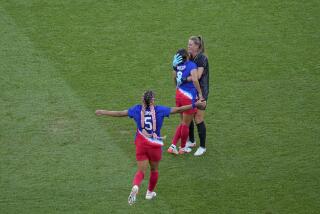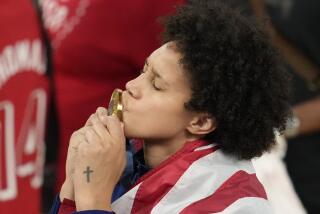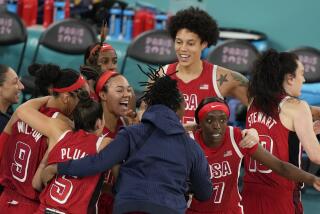U.S. Women Turned Sacrifices Into Gold
- Share via
Angela Ruggiero let the happy tears flow.
Ruggiero, from Simi Valley, was 12 when women’s ice hockey was added to the Winter Olympics program in 1992. Now, after retrieving the game puck so she could later give it to her father, she prepared to have the gold medal placed around her neck.
It was a best-remembered moment from the Nagano Olympics, a year ago today.
The U.S. women’s team swept through the Olympic tournament with a 6-0 record and beat intense rival Canada, 3-1, in the gold-medal game.
Americans learned of their sacrifices.
* Lisa Brown-Miller, 31, who had been with the women’s U.S. hockey program since Day 1, could take her honeymoon, postponed 2 1/2 years because of hockey commitments.
* A.J. Mleczko could return to premed studies at Harvard, which she had left two years earlier to make the U.S. team.
* Gretchen Ulion could resume her teaching career.
And for once, the American women didn’t have to hear “O Canada” on the awards stand. Canadian teams had beaten the U.S. at the previous four world championships.
Also on this date: In 1968, at Grenoble, France, Jean Claude Killy zoomed down a foggy mountainside to achieve an Alpine triple--gold medals in the downhill, giant slalom and slalom. One spectator, U.S. promoter Mark McCormack, said Killy could earn a million dollars by turning pro, calling the Frenchman “an Arnold Palmer in ski pants.” . . . In 1968, Harmon Killebrew became the Minnesota Twins’ highest-paid player when he signed for $75,000. . . . In 1978, UCLA’s swim team beat USC, 60-53, ending the Trojans’ 49-meet winning streak. . . . In 1954, baseball’s grand old man, Connie Mack, 91, predicted that the West Coast would have major league baseball in “two or three years” (it was four) and said he hoped his Philadelphia Athletics would become the Los Angeles Athletics. . . . In 1937, Joe Louis, in his last fight before winning the heavyweight title, stopped Natie Brown in four rounds at Kansas City, Mo. . . . On the same day, USC and UCLA informed the Coliseum Commission they would play their home football games in the Rose Bowl if pro football teams were permitted to use the Coliseum. (UCLA moved to the Rose Bowl after the 1981 season.)
More to Read
Go beyond the scoreboard
Get the latest on L.A.'s teams in the daily Sports Report newsletter.
You may occasionally receive promotional content from the Los Angeles Times.







